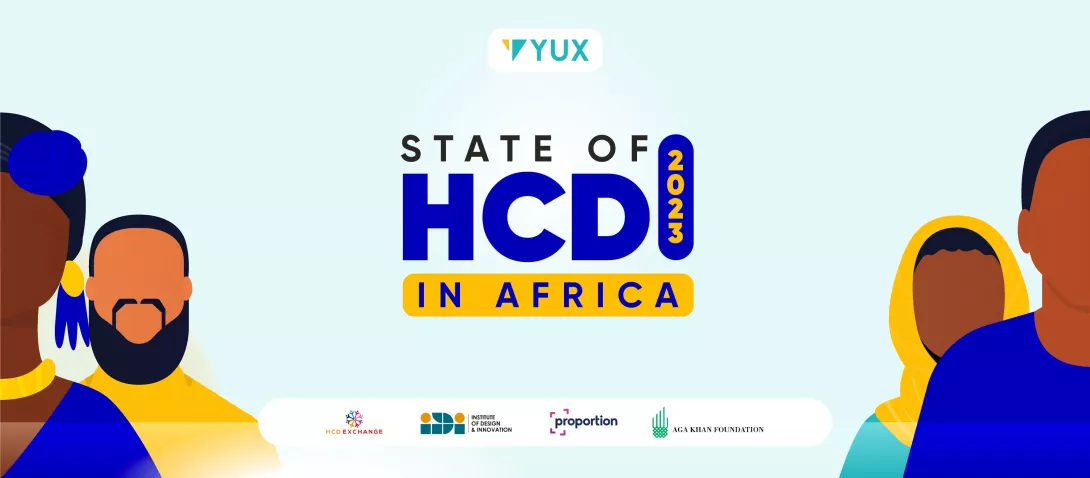
YUX, a pan-African research and design agency headquartered in Dakar, Senegal, and with teams in Lagos, Accra, Kigali, Nairobi, and Abidjan, launches its first edition of the “State of HCD in Africa” report. The work at YUX focuses on Human-Centered Design as this approach aligns with the organization’s vision for Africa, where people are empowered to create their own future based on their unique needs, culture, and identity.
Inspired by the initial flagship study on The State of User Research in Africa, a need to further explore the implementation of HCD within organizations that operate beyond the realm of tech companies and startups was identified.
Despite certain successful HCD initiatives in Africa, insights from both successes and failures often remain confined within the consultancies and organizations involved. As a result, community wide conversations and context specific data remain elusive.
This is why YUX has made the decision to initiate The State of HCD in Africa Study. This study aims to address the existing gaps and challenges of applying HCD in Africa, by breaking down the barriers that have traditionally confined HCD knowledge and insights within distinct silos. The goal is to develop a comprehensive understanding of HCD approaches and methodologies, pinpoint challenges and limitations inherent in the application of HCD within the African context while also delving into potential areas for advancement and growth in the field.
Many thanks to the community partners: HCD exchange, Proportion, Aga Khan Foundation and Institute of Design and Innovation. Also, a huge shout out to HCD professionals from Dalberg, UNICEF, Wikimedia Foundation, International Organization of Migration, and Thinkplace. From participating in the consultations to helping to frame the survey questions and reviewing the report; your efforts and contribution to this initiative are greatly appreciated.
The result of this study is based on consultations with 10 industry professionals from various countries across the continent and 114 survey responses from across 29 countries.
Some key findings from the report include:
There is a greater recognition in HCD’s ability to help one understand the user and context (92%) compared to improving the sustainability and scalability of solutions (46%).
Barriers to a locally-driven process could be overcome by enhancing awareness of HCD processes at the local level in addition to addressing organizational power dynamics.
Most respondents (54%) identified translation of findings into programmatic and policy action as a primary gap in the capacity building amongst HCD practitioners.
65% of the HCD practitioners who answered the survey work in the health sector.
There is a mismatch in the terminologies associated with HCD activities between practitioners in agencies and those in development organizations.
Anecdotal evidence (e.g follow-up interviews) are utilized more (56%) than rigorous methods (e.g RCTs) (12%) when measuring the effectiveness of HCD.
NGO’s tend to hire external consultants and design agencies to conduct trainings for their staff on HCD.
In addition to increased funding, tailored research tools and a culture of shared learning are key to elevate the state of HCD in Africa.
The report includes some inspiring HCD initiatives and highlights the role HCD plays as a force for positive change, driving innovation and collaboration across diverse communities and sectors. While the future looks promising, addressing HCD's shortcomings is crucial. This includes tackling issues related to capacity building, improving accountability in interventions, and restructuring organizational frameworks to optimize HCD practices.
Addressing these challenges requires collective effort; individual solutions fall short of the transformative aimed for. It's time for meaningful conversations, where HCD communities come together with a shared vision for positive change. The journey begins together, initiating conversations fueled by the insightful "How might we" questions that have been outlined throughout the report. Also, engaging events are in the works, designed to cultivate a sense of community and facilitate conversations about the dynamic landscape of HCD within the African continent. We genuinely hope to see YOU there, as your perspective is crucial to shaping the future we collectively envision.
In the meantime, download the 2023 State of HCD in Africa report, dive into the insights, and share your thoughts through this Feedback Form .
Happy Reading!
